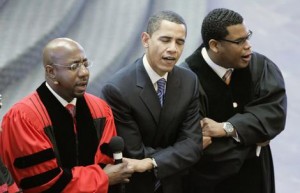
At times we need to remember that the modern Civil Rights Movement did not begin in a fashionable salon where artists and intellectuals exchanged ideas, but in a Church, under the leadership of the Rev. Martin Luther King. In fact, from providing a philosophical basis for resisting British tyranny in the 18th century, to the moral rational for the abolitionist movement in the 19th century, it was the faith community in America that supplied not only the convictions, but much of the leadership that brought about these revolutionary changes. William Wilberforce, the dynamic Member of Parliament, who spent his life campaigning for the end of slavery in the British Empire, gained his moral conscience largely from the influence of his Pastor, John Newton, a reformed slave ship captain, and author of the song “Amazing Grace.”
Though vilified or lampooned because of failures, hypocrisy or the actions of terrorists, it is a historical reality that the faith community is a thriving group who stands proudly on their societal convictions and they are not for sale. It was through the inspiration of this self-motivated society that the first hospitals were built, along with the first orphanages, the first universities. The faith community is credited with preserving the art and literature of Western Culture. Everyone, who has trudged through a Twelve Step program and people who have a friend or relative who found sobriety, understands the remarkable power of this inescapable force.

What is more, though Richard Dawkins’ much publicized thesis, The God Delusion, sold over 1,500,000 copies in English, Rick Warren, a California pastor’s, Purpose Driven Lifehas sold over 33,000,000 copies in the U.S. alone. These facts and figures underscore an influence which should not be ignored. C.S. Lewis wrote, “It is the people who are focused on an afterlife that seem to make the greatest contributions in the here and now.” Even if we will not settle this controversy, we can grasp the not-for-sale benefits the faith community makes in our own communities.
Historically, the faith community has been faulted for sins and misgivings. Their usual response has been confession and turning away from the misdeeds. Yet, it’s vital for a nation to be able to maintain its intigrity that the banner of the faith community remains, “Not for Sale.”

